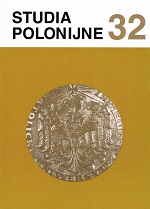Próby interwencji dyplomacji polskiej w obronie prześladowanej Polonii na Ukrainie Sowieckiej w latach trzydziestych XX wieku
Attempts of Interventions Made by the Polish Diplomacy in Defense of the Persecuted Polish Community in the Soviet Ukraine in the 1930st
Author(s): Robert KuśnierzSubject(s): Cultural Essay, Political Essay, Societal Essay
Published by: Towarzystwo Naukowe KUL & Katolicki Uniwersytet Lubelski Jana Pawła II
Keywords: Polish diplomacy; persecutions of the Polish community in Soviet Ukraine
Summary/Abstract: Victimizing Poles in the USSR in the 1930st is quite well described in historiography. However, the situation is much worse when an answer is searched for to the question about the attitude of the Polish Government and the diplomats of the Second Polish Republic to the repressive measures taken against Poles in the Soviet Union at that period. After an analysis had been made of the documents of the Polish Foreign Ministry and of the Division II of the Polish General Staff (military intelligence and counterintelligence, colloquially known as “Dwójka” – “Two”) that had been unknown until now we may state that representatives of the Second Polish Republic not only did attempt to support Catholic churches and parishes, but also aided common Poles who were persecuted. The attitude shown by the Head of the Polish Consulate in Kiev, Jan Karszo-Siedlewski, is an example here. When news reached him about the use of terror against Poles, about arrests and deportations, he was able to mention this question to the relevant authorities of the Ukraine in 1935, and finally even to meet the Head of the NKVD Wsewołod Balicki on 31st March 1935. The fact of the meeting between the Polish diplomat and such a high Soviet official is completely unknown in historiography. And this is why the present article aims at showing and introducing into history some new, until now unknown facts proving the involvement of Polish diplomats in defending Poles who were Soviet citizens against mass persecutions. However, despite the actions taken on the consular level the issue of the persecutions of Poles was not important for the Polish Government. Polish policies towards the Soviets were determined by the Non-Aggression Pact of 1932, prolonged in 1934. Hence the Polish authorities, trying to maintain good relations with the Bolsheviks, did not want to interfere in the issue of the persecuted Poles, treating it as an internal affair of the USSR.
Journal: Studia Polonijne
- Issue Year: 2011
- Issue No: 32
- Page Range: 143-168
- Page Count: 26
- Language: Polish

